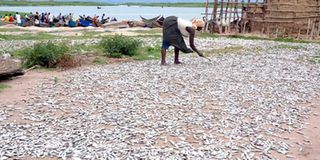Fishing industry loses Shs5b to poor handling every year - FAO

A woman dries silver fish from Lake Albert. Poor handling of fish has led to the country incurring losses amounting to billions of shillings. Photo by Martin Ssebuyira
What you need to know:
A campaign to teach the importance of hygiene and quality handling of fish has been launched.
Kampala- Uganda loses Shs5 billion in post-harvest processing of fish, something that is greatly impacting on the country’s economy, the United Nations Food Agricultural Organisation (FAO), has revealed.
FAO officials while at Post-Fish Harvest Loss Assessment in Kampala said sensitising people on hygiene and quality in handling fish in fisheries can minimise post-harvest fish losses.
“In Uganda, Post-harvest losses of small fishes (Mukene) range from 10 per cent in dry season to 90 per cent in the rainy season. Uganda loses US$1.5m (about Sh3 billion) to Mukene post-harvest losses alone. Fresh tilapia traders also lose about 5.2 percent of their catch to quality issues,” Mr Alhaji Jallow, the FAO Country Representative in Uganda said.
Improving hygiene
He said that FAO, with funding from the European Union has launched a multimedia awareness campaign on the importance of hygiene and quality in handling of fish in small scale fisheries.
The awareness campaign package, prepared with the direct involvement of small scale fishers, fish traders and consumers to educate their peers on the importance of hygiene to preserve fish, will be disseminated along 12 major landing sites around Lake Victoria in Busia, Namayingo, Mayuge and Buikwe districts.
Mr Jallow said: “It is imperative to undertake actions to reduce these losses. This will only be possible if fisher-folk, fish processors, traders, and consumers of fish products value the importance of hygiene and quality in the handling of fish.”
Losses
Figures: Statistical data shows that post-harvest losses in artisanal fisheries in Africa are estimated to range from 30–40 per cent and sometimes even higher. Such, experts say, are unacceptable in a country like Uganda where food insecurity and poverty affects millions of people.




